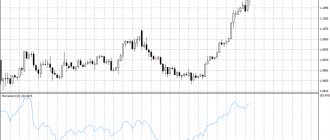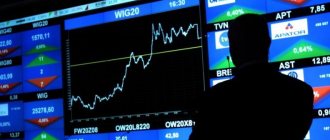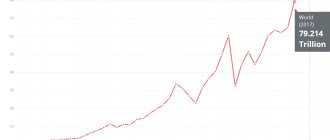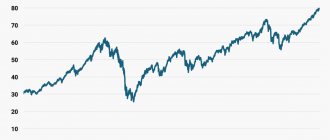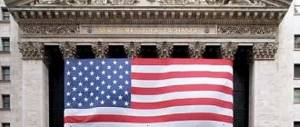Many people turn to financial markets in search of easy profits. After all, these sectors of the world economy allow you to trade almost any resource, even finance itself.
I will tell you in detail below how you can manage funds on the Forex market and what the Forex market is. And at the same time we will find out what differences it has from the stock exchange.
Trading as a type of work – what is its essence and where to trade?
Trading as a form of income appeared many centuries ago, with the emergence of the first exchanges. Speculators, right in their halls, spent all day long selling and buying stocks, securities, bonds, precious metals, or even very real goods (for example, grain), trying to profit from the difference in prices at certain points in time. It is worth noting that, although stock speculation was very common, until the end of the 20th century, access to it was strictly limited to a limited number of people. There were even certain concepts - “trader in the pit” and “trader in the floor” characterizing the professionalism, size of orders and success of the trader (small stock traders, for the sake of economy, took up space on the floor - in the “pit”, larger ones could buy a higher place, with a better view and access to monitors).
Everything changed with the spread of the Internet - today, everyone who has access to the Internet has the opportunity to become a “trader at the monitor” and, without leaving home, participate in trading on the largest Russian and international exchanges, play on currency quotes, and become the owner of shares in the largest companies peace. To do this, you only need to choose a reliable broker or dealing center, enter into an agreement with him and place funds on deposit, which will subsequently be used to purchase securities or other instruments.
Essentially, trading is trading any funds, be it currencies or stocks, with the aim of making a profit.
You, guided by your own strategy, buy or sell instruments, thereby benefiting from the price difference. In order for trading to be successful, you initially need to decide what is closer and more interesting to you - playing on currency quotes or buying shares.
Where do you need more money?
Imagine how much money would be needed on Forex if there were no such thing as “leverage”. So if a trader needed to buy 1 lot of Euros, he would have to currently have at least 107,000 dollars in his account, and to buy 1 lot of AAPL shares - 12,000, and I note that the shares of the “apple” company are currently worth where - twice as expensive as the average cost of US stocks.
Let's return to leverage. Maybe I’ll reveal a secret now, but in the stock market brokers also provide leverage, and the intraday leverage on the fund is enough to comfortably trade with an account of $500-1000, and if you consider that it is possible to split lots (1 lot = 100 shares) and generally trade one share at a time, a few dollars will be enough. So, to start, you need approximately the same amount of money in both Forex and the stock market (I have already given examples of calculating the minimum deposit).
Forex and the stock exchange are the main trading platforms
Trading is an excellent opportunity to strengthen or increase your income, which for many turns from additional income into main employment. The fact is that a professional and experienced trader with a clear strategy and an impressive deposit amount can receive profits from transactions on the stock exchange that are much higher than the average monthly Russian earnings. True, this requires constant training, a serious approach to business and interest in this type of income, but the result is very impressive.
The following instruments are open for trading today:
- Securities (company shares, bonds) - a trader buys shares on the stock exchange at a low price and sells them at a high price, thereby receiving income, or simply investing in growing stocks;
- Currency, or rather, currency pairs, on the fluctuations of rates of which relative to each other you can make a profit;
- Various raw materials (grain, precious metals, non-ferrous metals, oil, products, livestock, etc.) on special commodity exchanges;
- Derivatives and futures – that is, contracts for the supply of goods are traded.
Access to international currency trading is provided by the Forex market, and to other instruments by the stock exchange (in Russia this is the Moscow Exchange - the result of the merger of the largest players, MICEX and RTS). Before you start trading, you need to select the necessary instruments and gain access to the capabilities of a particular exchange.
It is worth noting that in a completely remote mode (“trader at the monitor”), which is what most novice traders are interested in, essentially only trading currencies, company shares and bonds are possible; less often, private traders are interested in precious metals and futures for the purchase of shares. The fact is that direct access to the exchange is not available for individual traders - to do this, you need to enter into an agreement with a professional broker (a registered company that has the right to conduct exchange transactions). Each such intermediary has a clear list of instruments to which it has access, and most often commodities on the commodity exchange, derivatives or rarer funds are not included in this list. This means that a private client of the broker will also not be able to trade using them.
The final choice of a trading instrument, and, accordingly, an exchange, directly depends on the personal desires of the trader, the chosen strategy and other factors:
- Time of day allocated for trading;
- Preference for technical or fundamental analysis;
- Do you have in-depth knowledge of any exchange instruments?
- The chosen methodology for conducting transactions;
- Long-term prospects;
- The desire to invest in stable funds or, on the contrary, to extract maximum profit from numerous risky transactions.
To finally answer the question, Forex or stock exchange, let’s take a closer look at the features of these platforms.
Control and regulation
Stock brokers always have government licenses and strict financial monitoring by regulatory authorities, such as the SEC, CFTC and NASD in the USA. In any problematic situation, the exchange risks losing its license and the trust of clients, therefore, in most situations, the rights of investors are protected, trading standards and financial discipline are observed, and unfair competition is suppressed. Typically, the stock broker is the withholding agent and will pay the taxes on the participant's transactions.
Stock exchanges strictly adhere to the principle of “know your customer”, so opening a trading deposit for trading shares requires careful verification of documents and can take 5-7 days. Moreover, the slightest doubt about the reliability of the information or the legality of the origin of your capital will be interpreted as a refusal to cooperate.
The Forex market does not have a central regulator, which means a low level of control and a high risk of fraud. The offshore registration of most brokers only exacerbates the negative consequences. A Forex account can be opened in a few minutes; you can top up your deposit and start trading with virtually no document verification. Verification can generally be carried out only during the first withdrawal of money from the deposit. Taxes on transactions are the client’s concern; the broker does not deal with this.
Now there are already Forex brokers that have official regulation, are included in the deposit insurance system and in the program to combat illegal income, so if you choose the right partner (see rating), then it doesn’t matter to you whether Forex or the stock market - trading will be as reliable as possible.
Forex – online currency trading
There is a widespread opinion in Russia that Forex appeared quite recently, in the era of the active development of the Internet, and is intended exclusively for online trading through remote terminals. However, this is not entirely true - initially Forex was the name given to the interbank international currency exchange, on which the main trade was carried out. Forex has been operating since the 70s of the 20th century, but in fairness, we note that it gained fame and growth in volumes millions of times thanks to the Internet, when any trader from the most remote point of the world became able to conduct currency transactions in real time.
Main characteristics of the Forex market:
- This is an over-the-counter market, which means it is quite free and not limited by strict legislation;
- The essence of trading is to select one of the many currency pairs and further play on changes in their quotes relative to each other;
- Forex assets do not have a “physical” embodiment - which means that you will not be able to exchange your virtual tugriks, crowns or yuan for real banknotes;
- Work on Forex is carried out around the clock;
- The client gains access to the trading terminal after opening a deposit with one of the Forex market brokers. The latter also provides him with leverage, the ability to conduct technical analysis, news and reference materials, and the necessary training;
- On income received on Forex, it is necessary to pay personal income tax in the amount of 13%. In this case, the tax base is the difference between the funds withdrawn and deposited in the account for the tax period. As long as your income remains on deposit, there is no need to pay tax (although you will still have to submit a declaration).
Forex is perhaps the most famous and popular platform for online currency trading today, although all stock exchanges conduct such trading without exception. Traders in this market are individuals and legal entities from many countries, as well as banks, investment groups, brokers and dealing centers. Traders are attracted by a large assortment of currency pairs, high profitability of transactions, significant leverage, and ease of account management. In addition, legislation in the field of foreign exchange trading (especially Russian) is imperfect, and allows you to find many loopholes to reduce the tax burden and liability.
Where is the greatest earning potential?
Most traders are more concerned not with the risk, but with the potential (size) of profit that they can make when working in the market. And many (again, Forex experts) argue that this potential is much less in the stock market. I have always been curious how one can assert something while being in another bell tower. Anyway…
In the stock market, you can get risk-to-reward ratios that Forex traders can only dream of (there is also a separate article on this topic). But this is not a reason to plunge headlong into such trading. Things like this don't happen often, and you need to prepare VERY seriously for them. As for everyday trading, from my experience I can say that intraday income in both markets is approximately the same (plans and results), and it does not depend on the market, but on how much quality information is in the trader’s head.
Advantages and disadvantages of Forex
To understand how attractive Forex is for you, you need to understand what its features are. Let's start with the advantages of this foreign exchange market:
- Round-the-clock operation allows you to trade currencies from anywhere in the world in your free time - this is very convenient, especially if Forex is not your main occupation and only a couple of hours a day are allotted to it;
- Learning the basics of work is quite simple - there are many educational programs and training materials, most of them free;
- It is possible to choose any currency pairs, including quite exotic ones. This is very important if you have deep knowledge of the economies of some countries;
- The variety of brokers makes it possible to choose the most attractive working conditions and tariffs;
- Forex is a great start for novice traders, as it is quite simple and does not require large investments in the first stages;
- Large leverage (up to several thousand to one) allows you to earn money even with a small deposit;
- High profitability of transactions is what attracts traders to Forex. Profit can even reach thousands of percent in a short period.
It would seem that the choice is obvious - Forex is a profitable, simple and interesting currency market. However, it has significant disadvantages that should be kept in mind:
- Despite all its apparent simplicity, effective work on Forex requires deep knowledge of both fundamental and technical analysis - and even in this case, you are not immune from accidents and financial crises in a particular state, leading to the collapse of the national currency;
- The risk of Forex transactions is much higher than when trading other funds - the dependence on external factors is too great. As a result, Forex turns into something like an intellectual game, and not a source of stable income;
- Most brokers are offshore companies, which increases the risk of losing funds and the possibility of fraud. In case of controversial situations, it is very difficult for the client to defend his rights;
- With high profitability of successful transactions, there is a high possibility of significant losses, since currency jumps can be unexpected and very sharp;
- Forex is not suitable for investments and long-term strategies - to make a profit you need to devote a lot of time to it, constantly making short- and medium-term transactions (they can amount to hundreds per day);
- The lack of physical embodiment of assets leads to some uncertainty and “precariousness” of the trader’s condition.
What is better: the stock market or Forex - in numbers
Let's use Microsoft as our liquid stock and EUR/USD as our liquid currency pair.
When you trade Microsoft, you will pay:
- Market spread; and
- Commission to your broker.
Microsoft's price at the time of writing was about $52 per share.
The market spread can typically range from 2 cents to 5 cents for Microsoft under normal market conditions. This range is from 0.04% to 0.09%.
Commissions vary by broker, but you might pay 10 cents per share. The commission is paid upon opening and closing a transaction. Now let's compare this to EUR/USD.
The most common type of foreign exchange trading is on a commission-free spread basis.
This is exactly how our Trade.MT4 account works.
With this type of account you can pay 1 point spread to trade EUR/USD and commission-free.
Please note that we have a selection of account types that offer different services.
When trading EUR/USD at 1.1190, this round trip transaction cost is 0.0001/1/1.1190. Want to know the percentage?
This is less than 0.01%.
In this case, Forex has a clear advantage.
The cost of the reverse spread for trading a currency position is less than the market spread per share. And also, once you earn commissions on stocks, Forex trading will be even more profitable.
You can also find out real market prices using our demo account.
Stock exchange - if you want assets to have physical form
The stock exchange (in Russia we are most often talking about the Moscow Exchange) is a huge trading platform on which all available funds are traded - from stocks and currencies to kerosene, raw sugar and unprocessed cotton. This exchange employs thousands of brokers and dealing centers seeking to either invest in the most profitable assets or make a profit from active speculation in instruments.
The main features of the stock exchange include:
- Strict government regulation of all aspects of the operation of the exchange and its players;
- The ability to transfer most of the purchased funds into “physical” form - for example, order purchased shares in paper form;
- Complex and branched work structure;
- Specific work schedule – trading can only be done when the exchange is open;
- Both independent purchase of shares and acquisition of a share in a mutual fund are possible - that is, transfer of money to trust management;
- Income is subject to personal income tax, the basis for calculation is the difference between the “sale” price of the asset and its value at the time of purchase, transaction costs (broker commissions) are also deducted;
- Intermediaries on the stock exchange undergo mandatory licensing and inspections; they are subject to strict requirements that virtually eliminate the risk of fraud;
- Many instruments for long-term investment (precious metals, securities).
Thus, the stock exchange seems to be a more reliable structure than Forex, but requires a completely different approach and deep knowledge (or transfer of funds to trust management).
The more volatility, the more opportunities
I once had the opportunity to talk with the manager of a trading desk who, drooling, tried to prove that volatility is higher in Forex, which means there are more opportunities. Well, you can forgive him, he’s a manager. But, firstly, have you ever seen a currency that can move 2-5-10 percent of its value in a day? But the fund always has such shares. And where is volatility higher? Well, secondly, it is still not clear why some traders believe that increased volatility signals emerging opportunities. The market is a mess with high volatility, not opportunity.
But in terms of the number of trading instruments, Forex is two orders of magnitude inferior to the American stock market (I’m generally silent about the world market), only about 10 more or less adequate currencies, plus crosses collected from them (about 50+, and even then all DCs give this amount), this is against 7000+ shares on the America fund (and even if you collect paired spreads from them... or threes, or fours...). So, regarding the opportunities here, even by the number of assets, it is clear where there are more of them.
Advantages and disadvantages of the stock exchange
Let's talk about the attractive aspects of trading on the stock exchange:
- It is chosen by large, reputable investors as a reliable way to invest funds;
- Due to government regulation, the risk of deception and fraud is minimal;
- Excellent for long-term investments (for example, purchasing shares of large companies brings dividends and does not require constant work in the terminal);
- Choosing a broker is quite simple - independent companies constantly update ratings of the most reliable and profitable intermediaries;
- A huge number of tools gives you a choice;
- With deliberate and adequate behavior of the trader, the risk is significantly reduced and is not comparable to the losses that can be incurred on Forex.
Now let's talk about the disadvantages:
- The stock exchange does not provide a get-rich-quick effect - even the most successful traders do not receive hundreds of percent of profits in a matter of days;
- Leverage, as a rule, is no more than 3:1, which means that the deposit amounts must be very significant to obtain significant income;
- The operating hours are limited - you will not be able to trade on the stock exchange on weekends or at night.
Investor vs speculator
No matter how various “gurus” convince you, the path that seems simpler (in our case, Forex) does not always give the best result (that is, more money). Even if you have chosen a more speculative market for yourself, you should still understand how the exchange price is formed and why the main dynamics are still determined by stock exchanges. The choice of market type directly depends on your trading goals. The risk of incorrect market behavior is approximately the same.
Please note that Forex is a fairly “young” market, and therefore all the classical literature available to us is focused specifically on exchange trading. Some techniques are outdated, some are not inherently applicable to modern assets, so be critical of them. At the very least, you definitely won’t find clear recommendations on the better Forex in comparison with the stock exchange. Ask advice from modern “classics” who practice speculative trading.
Trade only what you understand well. To fight with stock exchange monsters, you need solid money, strong nerves and even more serious experience. For beginners, there is no problem what to choose: study the theory and practice strategy and tactics for profitable experience on small Forex deposits.
The stock market is for self-confident professionals who are not afraid of high transaction costs and strict exchange requirements, which is why there are many more successful traders there.
Take the risk of diversifying your capital and trading techniques: try to apply your skills in different markets - this will help you make more informed choices.
Profits to everyone!
What should a beginner choose?
As we see, both the stock exchange and the Forex market have their own characteristics, advantages and disadvantages. Each of these sites is good in its own way and suitable for specific purposes.
The choice of Forex is optimal if:
- You are just getting acquainted with trading - here you have the opportunity to work on a demo account or with minimal deposit amounts. It is quite easy to learn and does not require special knowledge;
- You strive to get rich quickly - the profitability of Forex transactions can exceed all reasonable limits. However, do not forget about reasonable caution;
- You treat trading like gambling - this approach is simply impossible on the stock exchange;
- You are going to make a large number of short-term transactions, fixing profits at a certain value, and do not want to invest in large but low-growing funds;
- The opening hours of the trading platform are important to you - Forex is available around the clock.
The stock exchange worth choosing is:
- You strive to minimize risks and are not prepared for large losses - but at the same time do not chase excessive profits;
- You need long-term investments in shares of reputable companies;
- You want to get a stable source of income (especially passive);
- You have deep knowledge in the field of technical and fundamental analysis that you are ready to put into practice - although analytical tools are also used in Forex, chance may be higher than their laws.
Where are the risks?
The risks are the same everywhere - this is the size of your deposit. If you work with constant risk in every trade (and this should be exactly the case, this is not the first time I’ve tried to hammer this home, webinar on this topic), then what difference does it make in which market you trade? Yes, absolutely nothing! The amount of risk in a trade does not depend on volatility, the price step, or which market you will be trading on. It depends on your trading plan and your ability to calculate the volume in a position. (Additionally, I recommend reading articles on minimizing risks and stable trading)
conclusions
So, an individual trader in Russia is offered either trading funds on the stock exchange or playing on currency quotes. The final choice depends on the capabilities and knowledge of the novice trader. The general rule is this: if you need short-term investments and making big profits, then it is better to choose Forex; if you need to invest and receive a stable income, you should give preference to the stock exchange. Successful traders combine work on both platforms, accumulating all the positive effects.
When did the Forex market appear?
The seventies of the last century were marked by the emergence of a powerful financial market. In many countries this became possible due to the transition to floating exchange rates of national currencies.
International finance has become an object of buying and selling along with all other goods. Their value began to be determined by a free market instrument, namely, fluctuations in supply and demand.
Therefore, soon, despite its “ youth ,” the Forex market quickly became a favorite trading platform for investors. After all, to make a profit, they no longer needed to invest money in a little-known business or promote some mossy product.
In addition, trading in the national currencies of certain countries did not require special skills. However, at first everyone was timid in combining their time on Forex with trading on the classic stock exchange.
Timing in trading
Here we will talk more about intraday trading.
You can often hear words like these from low-skilled traders: “there are trading opportunities every day, every minute, every second.” Perhaps there is some truth in these words, but not all of these opportunities are for one particular trader. After all, before looking for HIS opportunities, he must know when, where and under what circumstances to do this, and the answers to these questions significantly reduce this countless number of chances to a minimum, but rationally understandable and explainable.
It's no secret that money is made on the move. And in the first movement within a day it is easiest to earn money because... It is precisely in the first movements that large capital is present, which “defends” its positions. Here you can note specific hours of active trading both on the Forex and stock markets.
- Forex - about an hour before the opening of the European session, and before the first “correct” movement. Active work time can reach 6 hours a day (for me the maximum is somewhere from 9.00-10.00 to 15.00 Moscow time)
- NYSE - interval (half an hour before opening - hour after opening), total 1.5 (maximum 2) hours of active work per day
As you can see, the active time in the markets is different, and accordingly you need to choose a more convenient one, primarily based on the workload of the trader’s working day. For guys who combine trading with something else, the issue of timing needs to be put first.
Trading terminals
The analytical capabilities of most trading terminals (specifically trading ones) are quite flawed. Basically, such terminals are used for placing orders, and not for in-depth analysis (for the purpose of in-depth analysis, specialized platforms and software are used). So there won’t be much difference between the Forex and stock market terminals, all the same lists, charts and indicators. But there are still some differences, although not significant...
In the vast majority of cases in Forex, you can enter both the stop price and the profit price in the column of one order, although these are completely different orders. Those. You can enter the market with one order, place the second as a fixation of profit (counter-operation, if you bought, then you need to sell, limit order), and the third as a stop (the same direction as the profit, but the order type will be Stop).
Many Forex traders do not know this, and therefore do not know the structure of the market. Some of them say “the order closed in profit,” although the order cannot be closed, you can place it or cancel it, and a previously open position can be closed by sending a new order. Those. in order to make one trade, you need to send at least two orders.
Returning to the terminals, I repeat, the differences are not significant. And in general, working with placing orders is more a matter of habit, and you can get used to anything.
Which is easier to learn?
If you look soberly at the two proposed assets, then, of course, the behavior of stocks is easier to study than the behavior of a currency. Some may say that there is no difference, that both have very similar graphs to each other. CHARTS... that's how many people see the market - charts. This is the fatal illusion of the retail trader. Imagine for a second that there are simply no charts, and try to compare the understanding of these two assets. Do you understand what a stock is and, at least approximately, what factors influence its pricing? A similar issue with currency...
Many Forex traders think that they understand some relationships in currencies, and I don’t argue that they may understand some connections, but you need to take into account that there are a LOT of these connections, and in order to take them into account you need VERY serious qualifications, and much more serious than on the stock market.
In no case do I urge you to quit studying Forex and switch to stocks , especially to those guys who get real results from their trading. However, if there is no result, no matter how much the trader studies the market, no matter how much knowledge he has previously put into his head, he is a BEGINNER and is at the very beginning of his career, no matter how sad it may sound. And it’s actually easier to start studying trading with stocks, especially since the conditions for trading are practically no different.
- Which market is better to trade on?
- Trader's Notes
- Capital flows in markets
- Trading results since the beginning of 2016
- The difference between a trader and an investor
- The story of one quarter on Forex
